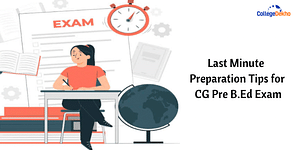B.Ed in Commerce Semester-Wise Syllabus and Subjects
B.Ed in Commerce Syllabus and Subjects Overview
The B.Ed in Commerce syllabus covers subjects that are designed to prepare graduates for teaching roles in commerce-related subjects at the secondary and higher secondary levels in schools. This is a specialised two-year undergraduate program focusing on core B.Ed in Commerce subjects like Childhood & Growing Up, Understanding ICT and Its Application, Learning and Teaching, Assessment for Learning, Gender, School, and Society and Drama & Art in Education.
The B.Ed in Commerce syllabus gives an in-depth understanding of commerce along with fundamentals of education. The B.Ed Commerce subjects included in the curriculum mainly impart knowledge of Business Studies, Accounting, Economics, Physical Education, English, etc. The B.Ed in Commerce course helps future educators gain skills and knowledge for their prospective career.
Table of Contents
- B.Ed in Commerce Syllabus and Subjects Overview
- B.Ed in Commerce Syllabus and Subjects Highlights
- B.Ed in Commerce Year Wise Syllabus
- B.Ed in Commerce Core Subjects
- B.Ed in Commerce Course Subjects
- B.Ed in Commerce Practical Syllabus
- B.Ed in Commerce Optional Subjects
- B.Ed in Commerce Specialisations
- B.Ed in Commerce Entrance Exam Syllabus
- B.Ed in Commerce Syllabus Important Books
- FAQs about B.Ed Commerce Syllabus
B.Ed in Commerce Syllabus and Subjects Highlights
The highlights of B.Ed in Commerce syllabus and subjects 2025 are provided here.
| Particulars | Details |
|---|---|
| Course Name | Bachelor of Education in Commerce or B.Ed in Commerce |
| Course Duration | 2 years |
| Total Semesters | 4 semesters |
| B.Ed in Commerce Core Subjects |
|
| B.Ed in Commerce Elective Subjects |
|
| B.Ed in Commerce Specialisations |
|
B.Ed in Commerce Year Wise Syllabus
The B.Ed in Commerce curriculum is typically divided into four semesters, focusing on both educational theory and specialised commerce pedagogy. The year-wise and semester-wise B.Ed in Commerce syllabus has been described in this section.
B.Ed in Commerce First Year Syllabus
The B.Ed in Commerce syllabus for the first year includes foundational education and subject knowledge. Take a look at the B.Ed in Commerce first year syllabus in the table below:
| B.Ed in Commerce Syllabus - Semester 1 | |
|---|---|
| Childhood & Growing Up | Contemporary Education in India |
| Language across the Curriculum | Pedagogy of School Subject 1 - Part 1 |
| Pedagogy of Commerce | Gender, School & Society |
| Understanding ICT and Its Application | School Exposure |
| Field Engagement | Reflecting and Reading on texts |
| B.Ed in Commerce Syllabus - Semester 2 | |
| Learning and Teaching | Assessment for Learning |
| Pedagogy of School Subject 2 - Part 1 | Pedagogy of Commerce - Part II |
| Knowledge and Curriculum | School Attachment |
| Community Living Camp | Field Engagement |
B.Ed in Commerce Second Year Syllabus
The B.Ed in Commerce syllabus for the second year has been provided in the table below:
| B.Ed in Commerce Syllabus - Semester 3 | |
|---|---|
| Educational Technology | Assessment for Learning 2 |
| Learning and Teaching 2 | ICT and Its Applications |
| Content & Pedagogy 2 - Part 2 | Fine Arts and Theatre |
| Pre Internship | Act and Drama in Education |
| B.Ed in Commerce Syllabus - Semester 4 | |
| Action Research | Gender, School, and Society |
| Creating an Inclusive School | Reading and Reflecting on Texts |
| Arts in Education | Understanding the Self |
| Health, Yoga, and Physical Education | Inclusive School Creation |
B.Ed in Commerce Core Subjects
The B.Ed in Commerce curriculum combines core education subjects with specialised commerce pedagogy to equip future teachers with both theoretical knowledge and practical teaching skills. The core B.Ed in Commerce subjects helps candidates to understand the important topics.
B.Ed in Commerce Core Subjects and Syllabus
The B.Ed in Commerce core subjects are the foundational courses that integrate core educational theory with practical teaching methodologies, focusing on subjects relevant to the commerce stream. Below are the definitions of core subjects typically included in B.Ed in Commerce syllabus:
| B.Ed in Commerce Subjects | Description |
|---|---|
| Childhood & Growing Up | Studies the physical, cognitive, and emotional development of children, providing insights into their learning processes. |
| Understanding ICT and Its Application | The subject focuses on incorporating Information and Communication Technology (ICT) into education, particularly in commerce teaching. |
| Learning and Teaching | Focuses on the theories and methods of teaching and learning. |
| Assessment for Learning | You will learn the techniques for evaluating and enhancing student learning. |
| Gender, School, and Society | Exploring the relationship between gender, education, and society. |
| Drama & Art in Education | Utilising and incorporating creative arts in educational settings and critical thinking among students. |
| Pedagogy of Commerce | Providing in-depth knowledge of teaching methods specific to commerce subjects. |
| Language Across the Curriculum | Integrating language skills across various subjects, enhancing communication and comprehension. |
| Assessment and Evaluation in Education | This subject covers the principles and techniques of assessing and evaluating student learning, including different types of assessments and grading systems. |
| Knowledge and Curriculum | Principles and practices in curriculum design. |
| Creating an Inclusive School | Preparing strategies for inclusive education. |
| Educational Technology | Introduces digital tools and resources to improve teaching and learning experiences among students. |
| School Internship | Offers practical teaching experience in schools, allowing students to apply theoretical knowledge in real classroom settings. |
| Project Work | Encourages independent research and application of educational concepts through projects related to commerce education. |
B.Ed in Commerce Course Subjects
The B.Ed in Commerce curriculum combines educational theory with practical teaching methodologies, focusing on subjects related to the commerce stream. The subjects covered under the B.Ed in Commerce syllabus have been discussed below:
| B.Ed in Commerce Subjects | Topics Covered |
|---|---|
| Childhood and Growing Up |
|
| Contemporary Education in India |
|
| Gender, School, and Society |
|
| Creating an Inclusive School |
|
| Pedagogy of Commerce |
|
| Understanding ICT and Its Application |
|
| Arts in Education |
|
| Understanding the Self |
|
| Health, Yoga, and Physical Education |
|
B.Ed in Commerce Practical Syllabus
In the B.Ed in Commerce course, practical components are often included to provide hands-on experience and practical skills development. These practical components can vary depending on the specific subjects and university requirements. Some common practical subjects in B.Ed in Commerce syllabus may include:
| Practical B.Ed in Commerce Subjects | Descriptions |
|---|---|
| Classroom teaching practice | Students may have the opportunity to observe and participate in actual classroom teaching, where they can apply teaching methodologies and strategies learned in their coursework. |
| Lesson planning and implementation | Students may be required to design lesson plans and deliver them in a classroom setting, allowing them to practice their teaching skills and assess student learning outcomes. |
| Educational technology integration | Practical sessions may involve using educational technology tools and resources to enhance teaching and learning experiences, such as creating multimedia presentations or utilising online learning platforms. |
| Field visits and internships | Students may have the chance to visit educational institutions, businesses, or organisations related to commerce, gaining exposure to real-world scenarios and industry practices. |
| Assessment and evaluation | Practical sessions may involve designing and administering assessments, grading student work, and analysing assessment data to inform instructional decisions. |
These practical B.Ed in Commerce subjects aim to bridge the gap between theory and practice, preparing students for their future careers in commerce education.
B.Ed in Commerce Optional Subjects
The B.Ed in Commerce optional subjects and their descriptions have been discussed here:
| B.Ed in Commerce Optional Subjects | Description |
|---|---|
| Financial Accounting | Takes into account the principles and practices of accounting, including the preparation and analysis of financial statements |
| International Business | Studies the dynamics of business functions across national borders, including trade policies, global markets, and international marketing strategies. |
| Business Ethics | Exploring ethical problems in business practices, highlighting moral decision-making and corporate social responsibility. |
| Taxation | Covers the principles and practices of taxation, including income tax, corporate tax, and tax planning strategies. |
| Retail Management | Taking into account the strategies and procedures involved in managing retail businesses, including inventory control, customer service, and marketing. |
| E-Commerce | Examines the use of internet technologies in business transactions, covering topics like online marketing, electronic payment systems, and digital business models. |
| Corporate Finance | Deals with financial activities related to corporations, including capital structure, investment decisions, and risk management. |
| Organisational Behavior | Studies the impact of individuals, groups, and structures on behaviour within organisations, aiming to improve organisational effectiveness. |
| Strategic Management | Focuses on developing and implementing strategies to achieve organisational goals, including competitive analysis and strategic planning. |
| Investment Analysis | Concentrates on evaluating investment prospects, analysing financial markets, and assessing risk and return. |
B.Ed in Commerce Specialisations
The B.Ed in Commerce specialisations integrate foundational educational theory with subject-specific pedagogy, equipping future teachers with the necessary skills and knowledge.
| B.Ed in Commerce Specialisations | Description |
|---|---|
| Environmental Education | Focuses on teaching students about the environmental impact of business practices. |
| Value and Ethics Education | Addresses the integration of ethical considerations and value-based education in commerce teaching. |
| Information and Communication Technology (ICT) in Education | Explores the use of ICT tools to enhance teaching and learning experiences. |
| Educational Leadership and Management | Prepares educators for administrative roles within educational institutions. |
| Educational Psychology | Applies psychological principles to enhance teaching effectiveness and student engagement in commerce subjects. |
| Curriculum and Instructional Design | The specialisation focuses on creating instructional materials and strategies that align with educational standards and student needs. |
B.Ed in Commerce Entrance Exam Syllabus
Many colleges offer admission to students on the basis of their scores in B.Ed entrance exams. In the B.Ed in Commerce entrance exam syllabus, common topics that are typically included are:
| Entrance Exam Section | Topics |
|---|---|
| General Knowledge | Current affairs, national and international events, sports, awards and recognition. |
| English Language | Grammar, vocabulary, comprehension passages, sentence formation, and error detection. |
| Quantitative Aptitude | Basic arithmetic, numerical ability, data interpretation, and problem-solving. |
| Reasoning Ability | Logical reasoning, analytical ability, series completion, and pattern recognition. |
| Teaching Aptitude | Principles and methods of teaching, educational psychology, classroom management, and assessment techniques. |
B.Ed in Commerce Syllabus Important Books
The best books for B.Ed in Commerce include all the important subjects and syllabus. Find here the B.Ed in Commerce syllabus important books:
| Name of the Book | Author/ Publisher |
|---|---|
| Teaching Aptitude and Attitude | S. Chand |
| General Knowledge 2025 | Arihant Experts |
| Quantitative Aptitude for Competitive Examinations | R.S. Aggarwal |
| English Grammar in Use | Raymond Murphy |
| Logical and Analytical Reasoning | A.K. Gupta |
| Pedagogy of Commerce | S.M. Acharya |
| Teaching of Commerce | Dr. S.K. Bhatia & Dr. Anjali Shokeen |
| Teaching of Commerce (Vinod Publications) | Prof. Ashima Sood |
| Essentials of Educational Technologies and Management | Dr. C.S. Shukla |
| Adult Education: Policy and Performance | I Ramabrahmam |
| Modern School Administration and Management | Dr. R.N. Safaya |
| Guidance and Counselling | Meenakshisundaram |
These are just a few books that can be helpful for B.Ed in Commerce preparation. It is important to note that the specific books you choose may depend on your learning style and preferences. It is always a good idea to consult with teachers, seniors, or coaching institutes for further guidance on recommended books for B.Ed in Commerce syllabus preparation for entrance exams.
FAQs about B.Ed Commerce Syllabus
Are there any practical and internships to be completed in the B.Ed in Commerce program?
Yes, under the B.Ed in Commerce course, practical’s and internships are part of the curriculum and need to be mandatorily done to complete the course.
Is a B.Ed in Commerce course difficult?
No, a B.Ed in Commerce course is not difficult as such, an individual with hard work and consistent practice can complete the course with ease.
What is the syllabus for B.Ed in Commerce entrance exams?
The syllabus for B.Ed in Commerce entrance exam is as follows:
- Broad knowledge encompassing current events, both domestic and global, sports, accolades, and recognitions.
- Proficiency in English involving grammar, vocabulary, understanding passages, constructing sentences, and identifying errors.
- Numerical skills covering fundamental arithmetic, numerical proficiency, interpreting data, and solving problems.
- Cognitive skills such as logical reasoning, analytical thinking, completing series, and recognizing patterns.
- Competence in teaching, including understanding principles and methods, educational psychology, managing classrooms, and employing assessment techniques.
Is B.Ed in Commerce in distance mode valid?
Yes, distance B.Ed in Commerce courses are valid in India.
What are the career opportunities for B.Ed in Commerce course graduates?
The B.Ed in Commerce course graduates career opportunities include Teachers, Content Writers, and Principal. Counselors, Translators, Creative Writer, Curriculum Developer etc.
What is the duration of the B.Ed in Commerce program?
The B.Ed in Commerce program spans for 2 years divided into four semesters.
Are there any practical sessions in the B.Ed in Commerce course?
Certainly, the B.Ed in Commerce program includes hands-on sessions incorporating case studies, group discussions, presentations, and practical activities associated with both commerce and instructional approaches.
What are the common subjects included in the B.Ed in Commerce syllabus?
The common subjects in the B.Ed in Commerce syllabus include Principles of Management, Business Communication, Financial Accounting, Marketing Management, Economics, Business Law, and Entrepreneurship.
Are there particular elective courses within the B.Ed in Commerce program?
Certainly, certain institutions offering B.Ed in Commerce may present elective choices like Financial Management, Human Resource Management, International Business, E-commerce, and Taxation.
Describe a concise outline of the B.Ed in Commerce curriculum?
The B.Ed in Commerce course structure commonly encompasses core subjects like Commerce, Educational Psychology, Pedagogy, Teaching Methodologies, and Electives, along with teaching internships for practical classroom experience.
Popular Courses
- Courses
- B.Ed in Commerce
- Syllabus


















